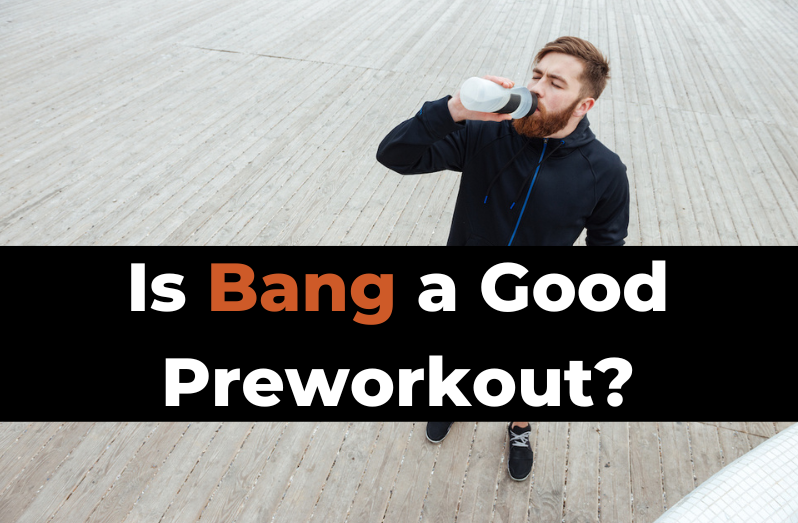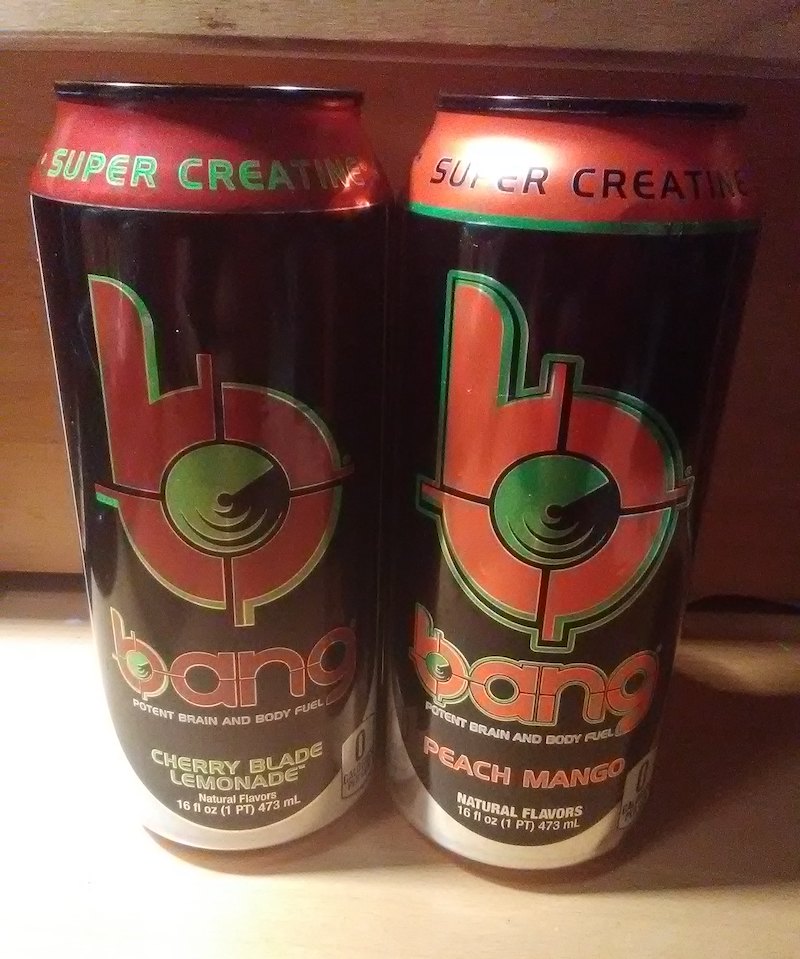In a world where rest is increasingly hard to come by, it’s no surprise that people turn to coffee and energy drinks to help eradicate tiredness before hitting the gym.
Some beverages are specifically formulated for this purpose, and they’re known as pre-workouts.
However, a lot of people find themselves wondering if they really need to pay a premium for a top-shelf pre-workout. Can’t you just use an off-the-shelf energy drink instead?
For example: Is Bang Energy a good pre-workout?

Bang Energy contains high doses of caffeine, some creatine, a few amino acids, and a good dose of B vitamins. These ingredients combine to make it a better substitute for a pre-workout than many other energy drinks on the market.
However, the carbonation could upset your stomach during the workout, and overall you’re still better off with a specifically-formulated pre-workout. But Bang will do great in a pinch!
Let’s take a closer look at the ingredients!
What’s the Difference Between Energy Drinks and Pre-Workouts?
At base level, you might think pre-workouts and energy drinks are the same because they share a goal to get you energized.
However, execution is everything, and the formulas used by energy drinks and pre-workouts are rarely the same.
Energy drinks (like Bang) use a mixture of caffeine and other energy-boosting ingredients to get your blood pumping. They may also include a couple of vitamins, which also boost energy. Many energy drinks also use sugar to give you a really quick spike when you need it, though sugar-free formulas are usually available, as well.
Some energy drinks even include ingredients designed to help increase physical and mental performance.
Typically, energy drinks are designed for a quick-release boost of energy; an immediate pick-me-up. They’re famous for the “crash” you’ll typically feel when the energy suddenly wears off after about an hour or so.
Pre-workouts, on the other hand, are like the smarter sibling of energy drinks.
They’ll get you energized using caffeine, but they don’t typically have the sugar. They have vitamins and other ingredients to give you a boost, and they’re usually better tailored to those about to engage in a workout.
Furthermore, the ingredients included in pre-workouts are formulated in a way to get them to work slowly. Instead of getting a sudden energetic hit followed by a hard come down an hour later, you’ll feel your energy levels gradually increase and decrease at a more comfortable pace.
(At least, that’s the case with quality pre-workouts.)
Alongside that, there are typically ingredients in pre-workouts to help reduce fatigue and promote recovery after a workout, because we all know that after a good session in the gym our muscles ache and we feel like it’s hard to do anything else for the rest of the day.
In short, energy drinks give you energy for a short amount of time, but pre-workouts provide you with longer-lasting energy boosts and post-workout aftercare.
What Do Studies Say About Bang As a Pre-Workout?
There aren’t that many studies about specific energy drink brands being used as pre-workouts, but surprisingly enough, there is one for one of Bang’s energy drink options.
The study looks at Bang Keto Coffee Energy Drink when used before a workout.
The study on the Bang beverage shows it had a minimal impact on muscular performance, but it did significantly increase the energy levels in those who consumed it. The energy levels remained higher post-workout than the control group, too.
This goes to show Bang is at least doing something right, and it isn’t relying solely on caffeine to provide people with energy.
This is good news, as caffeine has been shown to either increase or decrease a person’s athletic performance as the way it impacts people differs significantly.
How caffeine impacts you varies depending on genetics and even factors such as what you had for breakfast.
So for some people, caffeine may enable you to train for longer and with more power.
Others might feel nothing, or even feel some of the unpleasant side effects of caffeine consumption such as jitteriness, anxiety, headaches, and nausea.
On the non-physical side of things, caffeine has even been shown to increase attention span during workouts, even if its impact on performance is negligible.
One study on energy drinks used before workouts, which happened to use Bang, shows us that result.
So, essentially, the caffeine in energy drinks can have a positive impact on you mentally, but energy drinks’ effects on your physical performance vary significantly.
Plus, drinking an energy drink before a workout regularly can cause stomach irritation, increase your risk for type 2 diabetes, increased stress levels, and more according to one report.
In the end, how your body responds to caffeine and the other ingredients in the energy drink is what will determine how the drinks impact you personally.
It’s also worth noting here that most energy drinks are highly carbonated while your typical pre-workout is not. Carbonation can cause bloating and some discomfort, not ideal for hitting the gym.
Bang vs Pre-Workout Drinks Ingredients Explained

There’s 300mg of caffeine in a can of Bang Energy, which is pretty much the highest amount of caffeine you’ll find in an energy drink under 17 fluid ounces in size.
(A lot of pre-workout drinks, comparatively, have about half that amount.)
This, clearly, can influence you either way—give you tons of energy or none at all.
That’s why the other ingredients in energy drinks are so important to look at, because you can’t rely solely on the caffeine to do all the work.
Plus, it’s the other ingredients that make or break a beverage as a good pre-workout.
Some ingredients typically included in good pre-workout drinks help increase your endurance levels, aid in recovery, delay fatigue, and help with your blood flow.
They can also help increase the amount of focus you have during your workouts.
The ingredients usually include:
- L-Theanine
- Beta-Alanine
- Creatine
- Betaine Anhydrous
- Citrulline Malate
- Branched-Chain Amino Acids
Now for comparison, let’s see what’s hidden inside a can of Bang Energy:
- Carbonated Water
- Citric Acid Anhydrous
- Malic Acid
- Natural and Artificial Flavors
- Caffeine Anhydrous
- Sodium Benzoate
- Potassium Citrate Monohydrate
- Sucralose
- L-Leucine
- Potassium Phosphate Dibasic
- Vitamin C (Ascorbic Acid)
- Calcium Chloride
- Acesulfame Potassium
- Potassium Sorbate
- Calcium Disodium EDTA
- Magnesium Chloride
- Super Creatine (Creatyl-L-Leucine [Creatine Bonded to L-Leucine]
- L-Isoleucine
- L-Valine
- Vitamin B3 (Niacinamide)
- Coq10 (Coenzyme Q10)
- Vitamin B6 (Pyridoxine Hydrochloride)
- Vitamin B12 (MethylCobalamin)
Many of these ingredients are unsurprising. You have the typical flavoring ingredients, freshness preservatives, and carbonation found in most energy drinks.
Plus, a great deal of energy drinks include a lot of B vitamins as they’re highly beneficial for your body.
What’s surprising to find is the creatine, as most energy drinks don’t include this. In this instance, we’ve ticked off at least one ingredient normally included in a good pre-workout.
Creatine can increase muscular endurance, and it’s also good for helping build muscle mass after a workout.
There are also a couple of amino acids found in Bang, which as seen above are found in a lot of designated pre-workout drinks. The amino acids in Bang are L-Valine, L-Isoleucine, and L-Leucine.
Amino acids help repair tissue, build muscle, and boost energy, so they’re definitely something good to have in an energy drink you wish to use before a workout.
There are further positive ingredients in Bang Energy, including Coenzyme Q10 to convert food into energy, and magnesium and calcium chloride to help prevent low levels of those substances in the blood.
Finally, Bang Energy uses artificial sweeteners instead of sugar, so you won’t experience a terrible sugar crash after consuming it.
All in all, the ingredients in Bang Energy compare nicely to most pre-workouts. If you’re going to use an energy drink before the gym, Bang may be one of your top choices.
Wrapping Up and Verdict
Most of the time, energy drinks are okay substitutes for pre-workout beverages in a pinch. However, Bang Energy is a surprisingly good substitute.
I wouldn’t recommend Bang Energy being your go-to pre-workout beverage, as the extremely high dose of caffeine can have negative effects on your body, it’s still missing some essential ingredients from pre-workout drinks, and it’s carbonated.
Carbonated drinks can cause a lot of discomfort while you’re working out!
However, if you can’t get your hands on a pre-workout, then Bang Energy is a better substitute for one than many of the other energy drinks you’ll find on a typical grocery or convenience store shelf.
It’s not ideal to drink Bang Energy every day or before every single workout, but it’ll certainly give you a decent boost and help out your body for a while after you hit the gym.
Fore more, see a breakdown of:
Hope this helps!